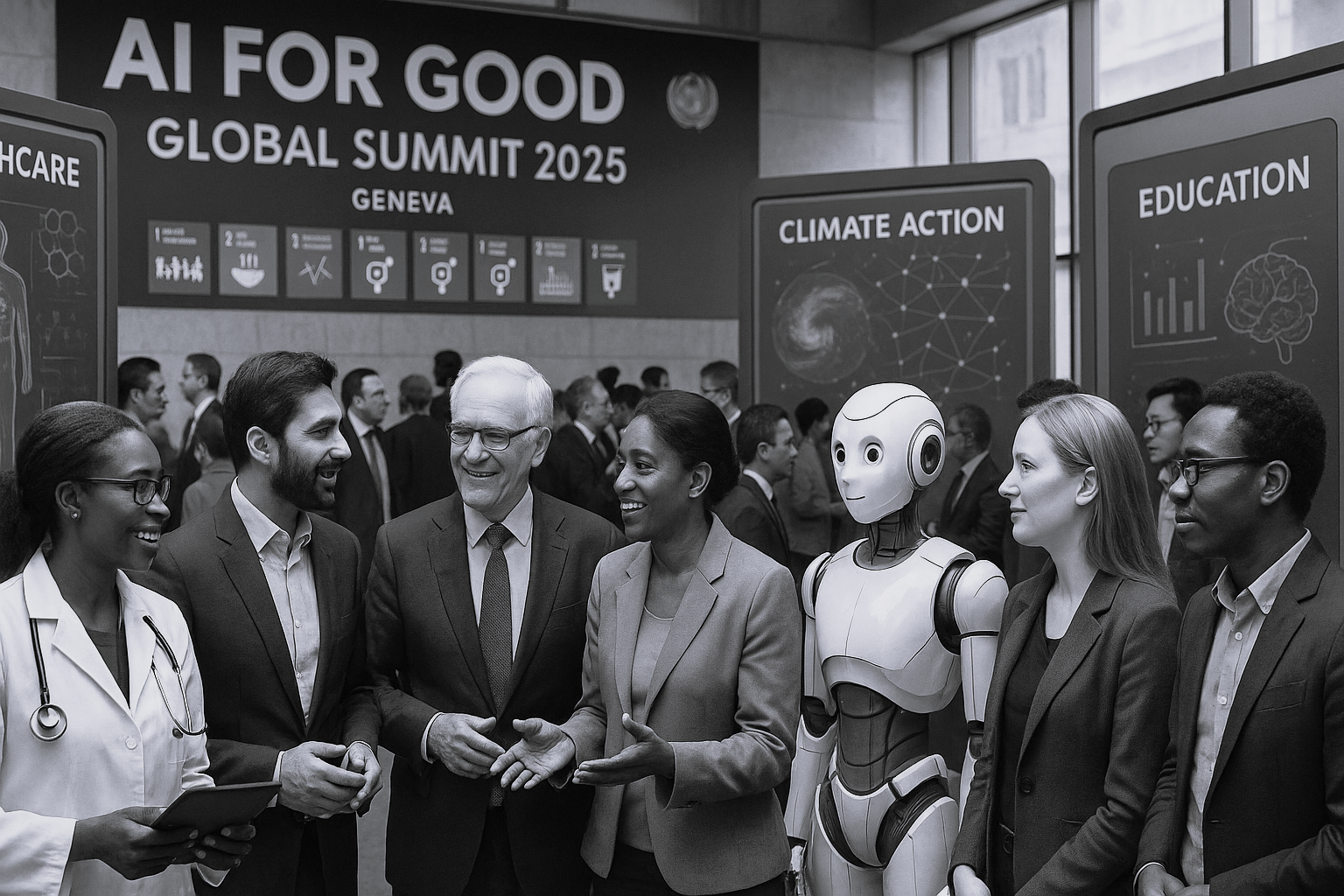
AI Gets a Job… and It’s Trying to Save the World
In an era dominated by headlines about AI’s potential risks and disruptions, a powerful counternarrative is emerging. Artificial intelligence isn’t just transforming businesses—it’s taking on humanity’s most pressing challenges. This July, the global AI community will converge with a singular focus: harnessing advanced technologies to create a better world for all.
The AI for Good Global Summit: Where Technology Meets Humanity
The AI for Good Global Summit 2025 represents the United Nations’ most ambitious effort to align artificial intelligence with human progress. Organized by the International Telecommunication Union (ITU) in partnership with over 40 UN agencies and the Swiss government, this landmark event will take place July 8-11, 2025, in Geneva, Switzerland.
Unlike typical tech conferences focused on commercial applications, this summit has a more profound mission: identifying and scaling AI solutions that can accelerate progress toward the UN’s Sustainable Development Goals (SDGs). It’s where technological innovation meets humanitarian purpose.
Beyond the Hype: AI Taking Action on Global Challenges
The summit isn’t about theoretical possibilities—it’s about demonstrating tangible impact across several critical domains:
Health
From pandemic prediction systems to drug discovery algorithms that can reduce pharmaceutical development timelines from years to months, AI is revolutionizing how we approach global health challenges. The summit will showcase deployable solutions already saving lives in resource-constrained environments.
Climate Action
As environmental pressures intensify, AI systems are optimizing renewable energy grids, creating high-precision climate models, and even helping conservationists track endangered species. These technologies offer hope for evidence-based climate strategies when we need them most.
Education
AI-powered personalized learning platforms are democratizing access to quality education, adapting to individual learning styles, and breaking down barriers for students with disabilities. The summit will explore how these tools can be deployed equitably across diverse global contexts.
Gender Equality, Prosperity, and Infrastructure
Additional tracks will address how AI can help close gender gaps, create more resilient economic systems, and build smart infrastructure that serves all community members.
Setting the Rules of Engagement: AI Governance Day
Perhaps the most consequential component of the summit is AI Governance Day on July 10. As autonomous systems become increasingly integrated into critical infrastructure, the need for robust governance frameworks has never been more urgent.
This special session will bring together policymakers, ethicists, and technologists to establish guidelines ensuring AI development remains safe, beneficial, and aligned with human values. It represents a crucial opportunity to shape the global regulatory landscape before technological capabilities outpace our ability to govern them responsibly.
Building Bridges Through Standards: The International AI Standards Exchange
For AI to fulfill its global potential, systems must be able to communicate across borders and platforms. The International AI Standards Exchange on July 11 will focus on establishing technical standards that enable interoperability while maintaining security and ethical safeguards.
This work is essential for preventing a fragmented AI landscape where incompatible systems limit the technology’s ability to address transnational challenges.
The Voices Shaping AI’s Future
The summit will feature an extraordinary convergence of perspectives. AI pioneers like Geoffrey Hinton and Yoshua Bengio will share the stage with government officials, humanitarian workers, and representatives from communities that have historically been underrepresented in technological development.
This diversity of voices reflects a fundamental truth: for AI to truly serve humanity, its development must include humanity in all its diversity.
Why This Matters for Strategic Leaders
For those navigating the business implications of AI, the summit offers invaluable insights into how these technologies will shape our collective future:
- Expanding Opportunity Horizons: The focus on sustainable development opens new markets and use cases that extend far beyond current commercial applications.
- Regulatory Foresight: Discussions at the governance level will provide early signals about how the regulatory landscape is likely to evolve.
- Partnership Ecosystems: The collaborative nature of the summit creates opportunities to form strategic alliances across sectors and regions.
- Social License to Operate: As public scrutiny of AI intensifies, demonstrating alignment with ethical principles and humanitarian goals becomes increasingly important for maintaining stakeholder trust.
From AI Anxiety to AI Aspiration
The AI for Good Global Summit represents a pivotal moment in our relationship with artificial intelligence. Rather than fearing what these technologies might become, it invites us to actively shape them into tools for collective progress.
This isn’t about naive techno-optimism. It’s about recognizing that with thoughtful design, deployment, and governance, AI can become one of humanity’s most powerful instruments for creating a more equitable, sustainable, and prosperous world.
The question isn’t whether AI will transform our world—it’s whether we’ll harness that transformation to address our most fundamental challenges. The AI for Good Global Summit suggests that increasingly, the answer is yes.
Sources:
- https://dig.watch/event/ai-for-good-global-summit-20252
- https://www.itu.int/en/mediacentre/Pages/PR-2025-02-06-AI-for-Good-2025-announcement.aspx4
- https://aiforgood.itu.int6
- https://aiforgood.itu.int/summit25/programme/1
- https://opendatawatch.com/event/ai-for-good-global-summit-2025/7
- https://www.geneve.com/en/events/ai-for-good-global-summit-2025
From Space to Shorelines: How Global Plastic Watch Turns Pollution Data Into Action
Imagine spotting a hidden plastic dump from hundreds of miles above—then turning that insight into
GPT-5.2 Is Not About Smarter Answers. It’s About Better Thinking.
OpenAI’s release of GPT-5.2 is easy to misread if you focus only on feature lists or benchmarks. O
AI in Commercial Real Estate: 3 Future-Forward Projects Worth Watching
We’re not just building buildings anymore—we’re building intelligence into the environments we




